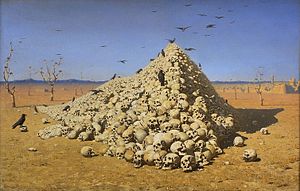Divine Right of Kings
The divine right of kings was a political and religious doctrine that asserted that a monarch has ultimate authority over man, deriving its right to rule directly from the will of God. The law ensured that medieval kings were not responsible for the will of the people, but rather working under God’s power. The doctrine implies that any attempt to depose the king, or to restrict his powers, runs contrary to the will of God and may constitute heresy. The theory came to the forefront in England under the reign of James VI of Scotland (1567–1625), James I of England (1603–1625), and also Louis XIV of France (1643–1715). The divine right of kings was slowed in England during the Glorious Revolution of 1688-1689.
The American and French revolutions of the late 18th century further weakened the theory’s appeal, and by the early 20th century, it had been virtually abandoned all over the world. The idea of the divine right of kings implicitly stated that no one but the king was worthy of punishing his own blood. This law created a problem for tutors in ancient times because the king was often times not available to raise his son. Royal educators found it extremely difficult to enforce rules and learning. For this reason, whipping boys were assigned to every young prince. When the prince would misbehave in class or cause problems for the tutors, the child’s whipping boy would be physically punished in front of the prince.
Whipping boys were generally of high birth, and were educated with the prince since they were a young child. For this reason, the future ruler and whipping boy often grew up together and in some cases formed an emotional bond. This occurred because the prince did not have any other playmates or schoolmates to bond with. The strong connection that developed between a prince and his whipping boy dramatically increased the effectiveness of using this technique as punishment for the royalty. However, as history has often taught us, some rulers have no sympathy for others who are perceived to be a lower class. In these cases, the royal whipping boys were tortured at the expense of the prince. The principle of the divine right of kings molded young ruler’s minds into the perception that they were untouchable. The life of a whipping boy was usually one of sorrow and pain. These children are noted for being an example of one of the first fall guys.



No comments:
Post a Comment